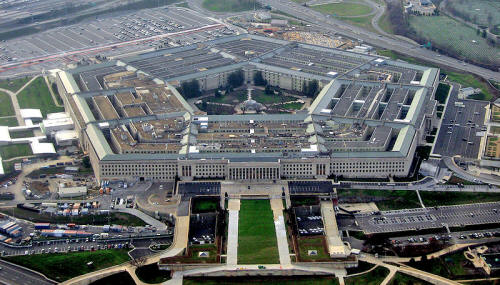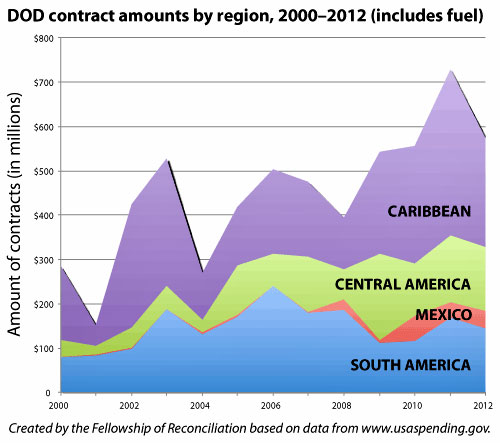|
from AntiWar Website
The US continues to militarize much of Latin America, spending enormous amounts of cash in order to prop up obedient regimes, train armies and militias, build new military bases, deploy more troops, and keep the military industrial complex fat and happy.
The US is building new military bases in,
...and elsewhere.
Hundreds of millions of US taxpayer dollars go to militarizing the region for the benefit of Washington and its corporate collaborators, but it ends up in some very nasty places.
John Lindsay-Poland at FOR, details some of the human rights abusers Washington is currently supporting:
And even though there is legislation that bans “most State Department-channeled military aid to the army” in Guatemala, the ban curiously “does not apply to Defense Department assistance,” and US military aid to Guatemala has increased more than seven times since 2009.
The US has recently expanded its mission in Honduras, referred to as Operation Anvil.
It is run with six State Department attack helicopters and a special team of commando-style Drug Enforcement Administration agents who have now been implicated along with Honduran security forces in the killing of innocent Hondurans on several occasions.
In June, a group of academics from around Latin America plus the US wrote a letter to the State Department protesting against the US military presence in Honduras and demanding that aid to the country’s abusive law enforcement apparatus be halted.
They exposed the drug war as the farce it is, charging,
And when Washington isn’t giving its support and training to human rights abusers, its military spending in the region exclusively helps the corporate entities in the military industrial complex.
Lindsay-Poland:
The US has a lengthy record of savage military interventionism and support for mass murderers in Central and South America.
The Obama administration has dramatically increased this long historical trend. One is tempted to point out how ineffective it has been under the stated drug war justifications, given that such approaches have only bolstered the black market drug trade.
But the truth is, this approach is incredibly effective in keeping obedient regimes in place, maintaining geo-political/economic/military dominance in the region, and deepening the pockets of Lockheed Martin, Raytheon, and countless other corporate welfare queens.
Latin America from ForUSA Website
The Pentagon signed $444 million in non-fuel contracts for purchases and services in Latin America and the Caribbean during the 2012 fiscal year, an overall decrease of nearly 15% from the previous year.
But US military spending in the region is still considerably higher than during the George W. Bush administration, when the equivalent Pentagon spending in Latin America averaged $301 million a year.
FOR conducted an analysis of Defense Department contracts listed on usaspending.gov for Fiscal Year 2012, building on the review we did last year. More than a third of funds for these contracts in the region are being carried out in Cuba, with $158 million for housing upgrades, intelligence analysis, port operations and other services.
The United States maintains the Guantanamo naval base in Cuba, site of the 11-year-old detention center that holds 171 prisoners without trial, many of whom have been cleared for release.
An additional $130 million in Pentagon contracts was for fuel purchases, including,
Such fuel purchases supply the Fourth Fleet of the Navy, as well as military aircraft and land vehicles used in exercises, operations, and training.
Colombia remained the country with the largest amount of Pentagon contracts in continental Latin America, with $77 million. A multi-year contract shared by Raytheon and Lockheed for training, equipment and other drug war activities accounted for more than a third of Pentagon contract spending in Colombia.
Honduras, which has become a hub for Pentagon operations in Central America, is the site for more than $43 million in non-fuel contracts signed last year.
The US Southern Command (SouthCom), responsible for US military activities in Central and South America and the Caribbean, is assisting the Panamanian border police, known as SENAFRONT, by upgrading a building in the SENAFRONT compound.
The force was implicated in killings of indigenous protesters in Bocas del Toro in 2011 and fired indiscriminately with live ammunition on Afro-Caribbean protesters last October.
Many countries that host US military activities hope to receive economic benefits and jobs as a result. But more than five of every six Pentagon dollars contracted for services and goods in the region went to US-based companies.
Only nine percent of the $574.4 million in Pentagon contracts signed in 2012 (including fuel contracts) were with firms in the country where the work was to be carried out. In the Caribbean, there were virtually no local companies that benefitted from the $245 million in Defense Department contracts.
A few corporations dominated Pentagon contracts in the region. CSC Applied Technologies, based in Fort Worth, Texas, received more than $53 million in contracts to operate the Navy’s underwater military testing facility in the Bahamas.
Lockheed Martin received more than $40 million in contracts, almost entirely for drug war training, equipment and services in Colombia and Mexico.
Pentagon Focus on Guatemala
Although the Pentagon spent less in most Latin American countries in 2012 than the year before, DOD contracts have more than doubled since 2010 in Guatemala, where there is a ban on most State Department-channeled military aid to the army.
However, the ban does not apply to Defense Department assistance. The contracts for nearly $14 million in 2012 amount to more than seven times what it was in 2009.
In addition, the US military spent another $8.1 million on fuel in Guatemala last year, probably for “Beyond the Horizon” military exercises held there and in Honduras from April to July, and perhaps to support the deployment of 200 Marines to Guatemala in August.
The contracts included new assistance to the Guatemalan special forces, known as Kaibiles, former members of which have been implicated in giving training to the Zetas drug cartel, as well as the worst atrocities during the genocide period of the 1980s. Two contracts, funded by SouthCom and signed in September, were for a "shoot house" and "improvements" at the Kaibiles training base in Poptun, Petén.
SouthCom also funded a contract for construction of a new $3 million counter-drug base in Santa Ana de Berlin, in Quetzaltenango. This year, SouthCom is slated to build a $1.8 million counternarcotics operations center and barracks in Mantanitas, Guatemala, according to an Army Corps of Engineers presentation.
The expenditures included equipment. For the last two years, SouthCom has been providing Boston whaler boats, radios, and tactical vehicles (Jeeps) to Central American militaries.
Guatemala is receiving more of the equipment than other countries in the region - 47 Jeeps and 8 Boston whalers, according to a SouthCom document. SouthCom signed a $2.5 million contract in September for Jeeps for Guatemala, and it has purchased more than $2.8 million of Harris military radios for Guatemala since September 2011.
Department of Defense contracts, summaries of which are posted on usaspending.gov, only represent a portion of Pentagon spending.
A report to Congress last April of Defense Department assistance worldwide showed more than $15 million in military aid to Guatemala in 2010, including $9 million for intelligence analysis, training, boats, trucks, night vision devices, and a “base of operations.”
These funds also included more than $6 million of unspecified support for Guatemalan police operations in Cobán, in the Guatemalan highland department of Alta Verapaz. The report didn’t include data after 2010.
On December 7, the Pentagon’s Defense Logistics Agency signed a $1.4 million contract with a Guatemalan firm to manage a 10,000-barrel supply of turbine fuel for the next five years in Puerto Quetzal, on Guatemala’s southern coast.
This followed a July 2012 solicitation to deliver 63,000 gallons of jet fuel to another southern Guatemalan site, in Retalhuleu.
FOR compiled data on the “country of performance” for contracts. For Guatemala, we also examined data on additional contracts that reference the country, which included a $2.5 million contract signed in late September with a Chrysler distributor to deliver tactical vehicles - some of the Jeeps slated for the country.
The US Army also purchased $7.6 million worth of trousers from a producer in Guatemala in 2012.
“Mini-Bases”
Some legislation for DOD drug war construction of bases and other infrastructure limits projects to $2 million, and the Southern Command continues to employ this authority frequently to construct a variety of facilities all over the Americas.
Here are some of the facilities the US military is constructing around Latin America:
|


